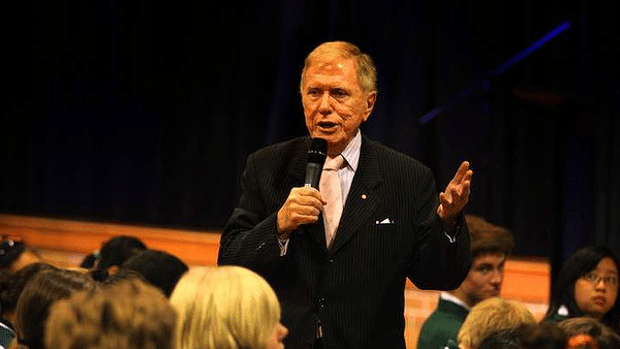Sometimes someone changes the world for the better … one person at a time.
A decade ago High Court judge Michael Kirby inspired the then confused, angry and suicidal sports journalist Andrew Webster to accept what he secretly knew: that he was gay.
A grateful Webster wrote to Kirby, who replied with this: ”I hope you will spare a little of your time to speak of your own journey, Andrew. If only everyone affected, including the families, did so, all this rubbish would evaporate and truth and science would take its place.”
Now Webster has told the story of his sexuality in the Herald … and the world has changed for the better.
Every person who reads Webster’s heart-wrenching account will surely be moved to tell someone else, who will tell another and another and so on it will go until ”all this rubbish” is consigned to history.
Before that can happen, the political, legal and practical obstacles are daunting.
Many advocates are torn. Should they pursue no-compromise reforms or easier civil unions like those proposed in a bill before the NSW Upper House?
The Herald believes same-sex marriage must come, so as to afford Australian homosexuals in love the same compassion, legal status and social acceptance as enjoyed by heterosexuals. Such recognition will not preclude objectors from continuing to practise their marriage traditions, nor encroach on core family values.
Good parenting is blind to sexuality. So are love, caring, empathy, respect and community cohesion.
But the Herald also recognises historic change can come only through national consensus.
The contributions of Kirby and Webster to that end are enormous, by stripping away dangerous stereotypes and shifting focus back to the human spirit. ”It comes down to whether you think I am good enough to be married to the person I love,” Webster wrote.
Most Australians support same-sex marriage but have given it a lower priority than other issues.
Webster would offer a solution: ”No march. No more debate. No more bullshit.”
That’s unlikely in the face of entrenched opposition on grounds of religion, culture and sometimes simple ignorance. All of these feed the fears of politicians.
The federal government has asked the High Court to scupper ACT laws that redefine marriage in a way that strikes directly at the legal and cultural history of man-woman unions.
A less-strident NSW bill debated this week creates a separate form of legally recognised union available to homosexuals. Amid such uncertainty across jurisdictions, national leadership is crucial. Without it, the debate may degenerate into divisiveness of the sort that has scuttled progress on an Australia republic.
Prime Minister Tony Abbott may prefer that outcome for same-sex marriage too.
But the contributions of Kirby, Webster and many Coalition MPs will make it difficult for him to delay the inevitable. He must know the only way to sort this out is to allow Federal Parliament to deal with it in an open and informed way.
The Coalition so far has denied its MPs a conscience vote. Abbott must now apply his moral weight to his partyroom so it can approve a conscience vote for every MP.
He should also allocate time for a private member’s bill to go before Parliament.
Any proposals must have the surest legal footing and broadest potential community support.
Such strong leadership would not require Abbott to abandon his personal preference for retaining marriage as male-female.
It would simply reassure Australians that Abbott will not allow extremists in his cheer-squad to deny the nation a chance to express its opinion through its elected representatives.
Same-sex marriage reform would be probably defeated in this Parliament in any case, partly because many Coalition MPs fear reprisals for publicly disagreeing with their leader or influential party figures.
But, free of party strictures, more MPs on both sides should stand on principle and participate in a true national debate.
The outcome may not emerge as quickly as many would like. Without an electoral mandate, it is hard to see national consensus for same-sex marriage before the next election.
But, rest assured that more voters are starting to see the human imperative for action, inspired by the stories of Webster and so many others among families, friends and workmates.
Author: Sydney Morning Hearld
Publication: Sydney Morning Hearld
Date: 5 November 2013

